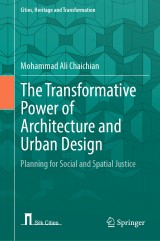Details
The Transformative Power of Architecture and Urban Design
Planning for Social and Spatial JusticeCities, Heritage and Transformation
|
149,79 € |
|
| Verlag: | Springer |
| Format: | |
| Veröffentl.: | 27.06.2024 |
| ISBN/EAN: | 9783031596070 |
| Sprache: | englisch |
| Anzahl Seiten: | 270 |
Dieses eBook enthält ein Wasserzeichen.
Beschreibungen
<p>Informed by urban political economy and critical social analysis, this book provides a critical comparative analysis of macro- and micro-level spatial design processes in architecture and urban planning. It interrogates the extent to which past and existing approaches to design have catered to social justice issues. With a special focus on the Right to the City approach and recent efforts to democratize urban spaces in the post-COVID 19 pandemic era, the book draws on examples of spatial design from the USA, Northern European countries and elsewhere to shed light on the presence (or lack) of social justice concerns in liberal capitalist and social democratic societies. This book is an important academic addition and resource for undergraduate and graduate curricula in architecture and urban planning/design programs, as well as a complementary resource for practitioners and policy planners who engage in urban development and transformation.</p>
<p>Part I. The City and Social Justice: Theoretical and Methodological Considerations.- Chapter 1 Addressing Social and Spatial Justice Issues in American Universities: A Review of Architecture and Urban Planning Curricula.- Chapter 2 Architecture, Urban Planning and Social Justice: The Role of Transformative Design in Achieving Spatial Justice.- PART II. Designing for Social Justice: Urban “Shelters”.- Chapter 3 Social Justice and the Right to Housing as a Transformative Vision: American and Global Examples.- Chapter 4 Spatial Design and Management of Refugee Camps: Al Za’atri and Its Transformation from a Temporary Shelter to a Permanent “Slum”.- Chapter 5 Punishment or Transformative Rehabilitation? Architectural Design and Management of Maximum-Security Prisons in the United States and Norway.- PART III. Designing City Spaces and Social Justice: Contested Urban Landscapes .- Chapter 6 Architecture of Racial Segregation and Landscapes of Collective Memory: Transformation of the South Carolina State House Grounds.- Chapter 7 Reclaiming and Transforming the Cities During and After the COVID-19 Pandemic: American and Global Examples.- Epilogue.- Chapter 8 Architects, Planners, and Social Activists as Transformative “Spatial Agents”: Prospects and Limitations.</p>
<p><strong>Mohammad Ali Chaichian </strong>is the professor emeritus of Sociology at Mount Mercy University. He received his PhD in Sociology from Michigan State University as well as two master’s degrees in architecture and urban planning from the University of Tehran and University of Michigan, respectively. A native of Iran, in addition to practicing architecture in Iran for ten years, he has more than forty years of research and teaching experience in the USA. His areas of expertise and interest are urban sociology, critical analysis of architectural design and the built environment, global political economy, international migration, and racial/ethnic inequalities. He has authored three books, <em>White Racism on the Western Urban Frontier: Dynamics of Race and Class in Dubuque, Iowa</em> (Trenton: Africa World Press, 2006); <em>Town and Country in the Middle East: Iran and Egypt in the Transition to Globalization</em> (Lanham: Lexington Books, 2009); and <em>Empires and Walls: Globalization, Migration, and Colonial Domination</em> (Leiden: Brill/Chicago: Haymarket Books, 2014 & 2015); and has published numerous scholarly articles related to above-indicated subject matters.</p>
<p>Informed by urban political economy and critical social analysis, this book provides a critical comparative analysis of macro- and micro-level spatial design processes in architecture and urban planning. It interrogates the extent to which past and existing approaches to design have catered to social justice issues. With a special focus on the Right to the City approach and recent efforts to democratize urban spaces in the post-COVID 19 pandemic era, the book draws on examples of spatial design from the USA, Northern European countries and elsewhere to shed light on the presence (or lack) of social justice concerns in liberal capitalist and social democratic societies. This book is an important academic addition and resource for undergraduate and graduate curricula in architecture and urban planning/design programs, as well as a complementary resource for practitioners and policy planners who engage in urban development and transformation.</p>
Presents a novel critical analysis of architectural design and urban planning based on social justice issues Provides a comparative approach to spatial design in both liberal capitalist and social democratic societies Offers insights on the “right to the city” platform’s concerns for social justice related to inequalities
Diese Produkte könnten Sie auch interessieren:

Observing Systems for Atmospheric Composition

von: Guido Visconti, Pietro Di Carlo, W. Brune, M. Schoeberl, Andreas Wahner

149,79 €
















